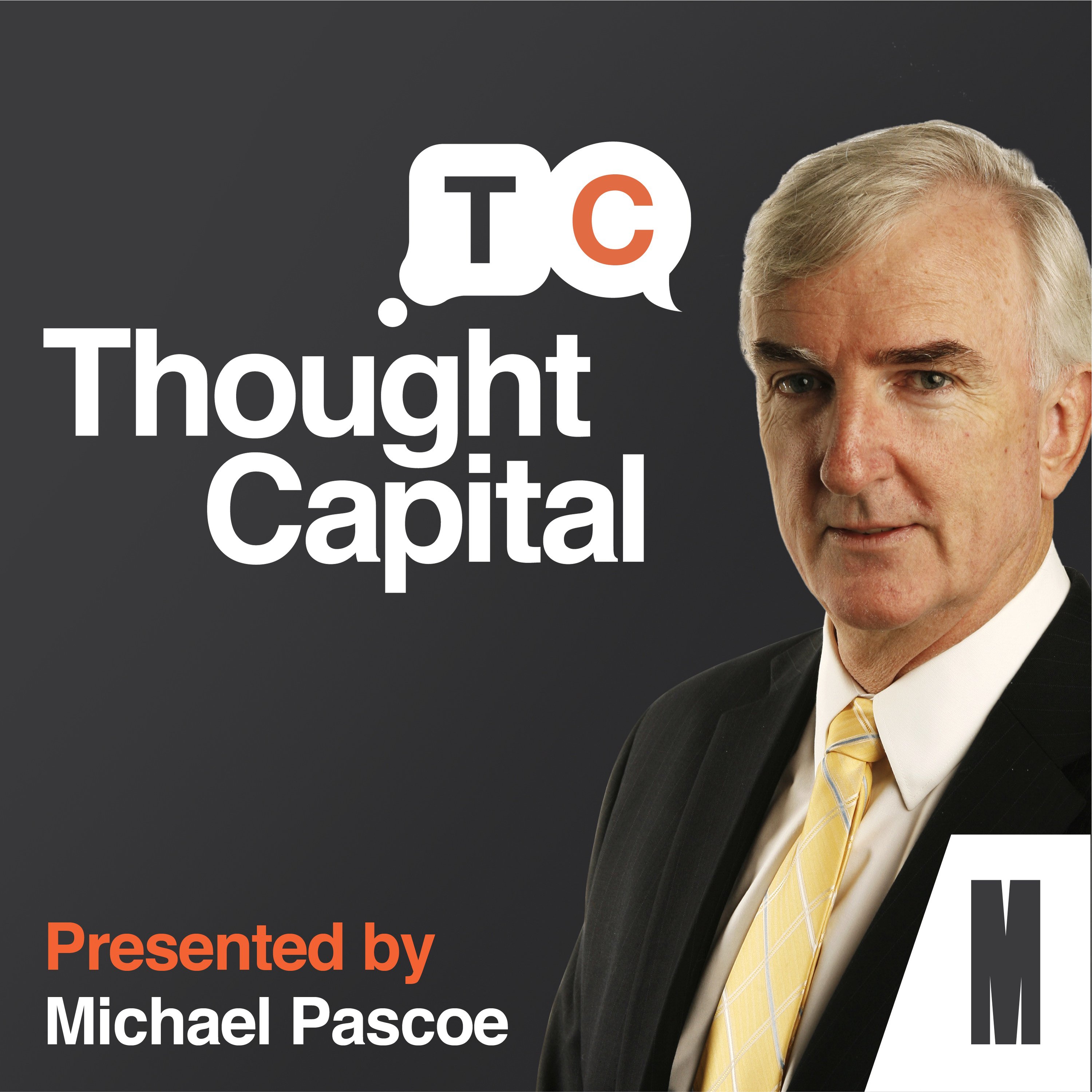Michael Pascoe: Hello. I’m Michael Pascoe. Welcome to Thought Capital, the podcast that delves into the wealth of ideas created by the experts at Monash Business School in Melbourne, Australia.
Wayne Gumley: The argument has always been that consumption taxes are regressive, but I don’t really buy that. Lower income groups buy a lot less stuff, and if you’re going to be in the million dollar plus category, your total purchases will be many times the multiple of a low-income earner.
Michael Pascoe: Let’s pretend for a moment we’re going on a journey to a paradise. Not just any paradise, a tax paradise. I’m not talking here about the tropical island Caribbean type tax paradise, but the ultimate tax system.
Michael Pascoe: In this episode, I’m talking with Wayne Gumley, senior lecturer in the Department of Business Law and Taxation, about what the perfect taxation system would look like in Australia, and why we may never get there. Or could we?
Michael Pascoe: Hello, Wayne. Welcome to the podcast. What would tax paradise look like to you?
Wayne Gumley: Thank you, Michael. My paradise would be a tax system where there was no distortions of consumption and investment decisions. Unfortunately, the Australian tax system is a long way from that. We have a tax system that’s built upon a long history of concessions and factional interests, and even some of the fundamental concepts of the system, like the income concept, mean that it is rapidly getting out of date.
Michael Pascoe: No distortions of decisions. It sounds all about efficiency from an economic point of view. Does that include the societal question of a progressive system?
Wayne Gumley: Yes, I believe it does. I think the most obvious distortion at present is the over-investment in real estate and particularly family homes, where the younger generations are being excluded from the fairness of being able to get into the market. That can be directly attributed to our capital gains tax regime and various other concessions that are built into the system, including negative gearing, of course.
Michael Pascoe: What’s your favourite sort of tax? Let’s turn that theory into money in the pocket, or out of the pocket.
Wayne Gumley: Well, I must say, I’m a fan of consumption taxes. Having taught income tax for many years, you become acutely aware of all the defects in the income tax base. It’s a perfect playing field for multi-national corporations or wealthy investors to pick and choose and avoid the system as best they can. At the other end of the spectrum, of course, you have us poor salaried wage-earners, who get taxed to the full measure on the full amount of income coming from a regular job.
Michael Pascoe: In your tax paradise, it would only be consumption tax?
Wayne Gumley: Oh no, I think you’ll certainly need to have that progressive element on the income side. However, I think there’s a good case for reducing the top marginal rates and getting rid of the arbitrage between individuals and corporates, for example, and also the trust income splitting arena. Also, you have to bring the corporates on board, because we’re not going anywhere without their consent. If we intend to increase consumption tax … I will include in that, resource taxation. I believe Australia is missing out on a large slice of tax revenue in those sectors.
Michael Pascoe: Land tax? A favourite of mine.
Wayne Gumley: Land tax, I think the experts would say, is quite an efficient tax and a fair one. It certainly adds progressivity to the system. We’re getting into the state taxation regimes now, but land tax also has lots of concessions for charitable organisations and farmers and so on, which tends to distort that field as well.
Michael Pascoe: And the sacred family home.
Wayne Gumley: Exactly, yes.
Michael Pascoe: In the Wayne Gumley tax paradise, you’ve got a big GST element?
Wayne Gumley: Yes.
Michael Pascoe: Less income tax element and a flatter income tax scale, by the sounds of it?
Wayne Gumley: Yes.
Michael Pascoe: Rent taxes, as in land taxes, resources rent taxes?
Wayne Gumley: Certainly, yes.
Michael Pascoe: Sounds like we’re ending up with a less progressive system.
Wayne Gumley: The argument has always been that consumption taxes are regressive, but I don’t really buy that. Just based on the simple fact that lower income groups buy a lot less stuff, and if you’re going to be in the million dollar plus category your purchases are pretty big. The total revenue that you will forsake in making those purchases will be many times the multiple of a low-income earner.
Michael Pascoe: But, as a proportion of your income?
Wayne Gumley: That’s a statistical artefact though, isn’t it? I tend to think more in absolutes. People should contribute an absolute amount to the system. Proportions are a little bit slippery, I think.
Michael Pascoe: Isn’t that what progression is all about?
Wayne Gumley: I think progression is about vertical equity, which tends to be based upon ability to pay. Consumption is an equally valid measure of your ability to pay, I think, as income is. In particular, people who invest in property or who own businesses tend to have very high ability to pay, but they also make very large expenditures.
Michael Pascoe: Is there a little bit of cart before the horse here? Talking about the ideal tax system without establishing what sort of society you want, and therefore what sort of taxes you need?
Wayne Gumley: Absolutely, and I think that’s what’s missing from the current political debate, definitely. The suggestion that we can sign off on long-term income tax cuts without explaining where the money’s coming from is just crazy and irresponsible I dare say. The last time I looked, almost every line of government expenditure is trending upwards. Think about how many submarines we might have bought recently, and where is that money coming from? It’s just crazy to think that we can cut income taxes. Income taxes are so important because if you look at the budget statement, you’ve got about 60 or 70% of our Commonwealth revenue coming from income taxes. It’s a system that’s way out of kilter.
Michael Pascoe: That’s a quick look at paradise. Meanwhile, back here, in reality, there are clearly taxes that do distort our behaviour, that are inefficient, that cost us almost as much to collect as they raise. What are the worst taxes from your point of view? Where would you begin to reform the system by getting rid of the worst first?
Wayne Gumley: Income tax itself has some unfairness attached to it, particularly at the lower income levels where welfare recipients go out into the workforce and face that punitive 50% reduction of their benefits.
Michael Pascoe: The people with the genuine problem with marginal tax as opposed to those at the top who think they have.
Wayne Gumley: Correct, correct. I mean, I could go on. There’s so many distortions in the income tax base. We can talk about small business here, where the government, every budget time there’s a new measure introduced to assist small business, which somehow happens to introduce a totally new set of rules with different thresholds and small business throw their hands in the air and think, “How on earth can we understand this?” So it’s just pushing up tax advice costs of course, for small business and that’s certainly an unfair aspect for start-up companies with not a lot of capital.
Michael Pascoe: Isn’t one of the problems with small business tax concessions is that it actually encourages businesses to stay small? As soon as you start having a differentiated system … Example, payroll tax; go a dollar over the threshold, and you’ve suddenly got 5,000 dollars’ worth of compliance costs to pay a dollar in tax, so let’s not employ another person. See, there’s distortions every time you turn around.
Wayne Gumley: Absolutely. In fact, you’ve made a very good suggestion there as to an unfair tax. Payroll tax is, I think, right near the top of the heap because it doesn’t make a lot of sense to inhibit job creation and that’s basically what payroll tax does. It is basically just a cash cow. The revenue could come from elsewhere, such as cranking up the GST rate a few notches.
Michael Pascoe: We’re still in paradise, in theory. Let’s look at all taxation holistically; you’d like to reform income tax. That’s something that keeps being fiddled with around the edges. What about the taxes that need replacing first in terms of their inefficiency? I mean, income tax is still fairly efficient.
Wayne Gumley: True. Fringe benefits tax comes up front and centre there. I’m puzzled as to the utility of fringe benefits tax, and I’m quite sure that the administration costs are very significant. Basically, I think that was just an act … Back in the 1980s, there was an act of political cowardice in not being prepared to make the employees pay the tax the on non-cash benefits they were receiving, so they followed a fairly unusual model of putting the tax on employers. There’s just no gains that I can see from that.
Michael Pascoe: Politics, of course, does come into it all the time in terms of what can be achieved. To replace stamp duty with land tax, the textbooks say that is an absolute winner from an efficiency point of view and an end of distortion. But, of course, when it comes to telling people, they’re going to pay annually what just a few people pay once or twice or three times with stamp duty becomes impossible. Is that an area you’ve looked at?
Wayne Gumley: Not closely, but I understand the efficiency of stamp duty because it’s being levied at a time when the purchasers have just been down to the bank, and they’re just going to add a small amount to the borrowings, so the stamp duty is more or less a hidden cost. It’s probably buried in their solicitor’s bill, and they hardly notice it. That’s a big jump, to suddenly now shift that to an annual levy. You would have to find some compensating benefits that people could quickly recognize in order to get that through.
Michael Pascoe: Dividend imputation, company tax; we’ve got a system that most of the world doesn’t have. Does that make our debate about company tax rates somewhat artificial?
Wayne Gumley: Yes, it does, doesn’t it? It also puts the Labor Party’s promise to knock out the refunds of franking credits for people without any income a pretty strange option, because the whole purpose of imputation was to pass on the company tax paid by the company to the shareholder as a credit and-
Michael Pascoe: Or was it to stop double taxation?
Wayne Gumley: … that was the mechanism. Certainly, it’s to stop double taxation, and I’ve been describing the mechanism for removing double taxation, and of course, under Labor’s plan, an element of double taxation would re-emerge, in that the benefit of the credit is lost and the tax is paid and not refunded.
Michael Pascoe: Why do you want to reduce the company tax rate?
Wayne Gumley: Well, Australia’s a little bit out of the ordinary. The rate is above the OECD mean, and it doesn’t make a lot of-
Michael Pascoe: That’s the nominal rate. Is the effective rate that far above?
Wayne Gumley: No, but that’s a different problem, I think. The effective rate results from very generous concessions throughout the system. It reflects some of the distortions that have been built into the system through treating companies as a separate tax entity.
Michael Pascoe: So, is it fair to ask for a caveat? When the business council is slapping the table saying, “We want a lower tax rate,” is it fair for society to say, “Well, okay, if we get rid of the distortions and you’d end up paying the same rate of tax anyway.”
Wayne Gumley: That would work for me.
Michael Pascoe: Part of the argument put forward in favour of a lower company tax rate is the idea that it would suddenly encourage more investment. That’s a bit of a furphy though, isn’t it?
Wayne Gumley: Well, yes. I’ve been reading a lot about Donald Trump’s statements in the U.S. The U.S. press have been following that one for many months.
Donald Trump: This is the largest tax cut in the history of our country. It is incredible. It’s going to put people to work. So, right now, Sean, we are the largest taxed nation in the world, and we’re going to be now down in the lower rung in terms of taxes-
Wayne Gumley: All the evidence seems to be that jobs don’t get created by the companies who enjoy the lower tax rates. What’s far more likely to happen is that there’ll be share buybacks or executive remuneration increases which are tied to KPIs, such as profitability. I think that would certainly be a very optimistic view to take; that this would create jobs. It would tend to be a little more of a distortion in pushing wealth into the hands of executive stockholders, et cetera.
Michael Pascoe: In your tax paradise, you wouldn’t have tax distorting decisions. Well, as little as possible. But taxes are used intentionally to distort decisions. We choose to put a whopping great tax on tobacco, to try to discourage people. We do give discounts for research and development, to try to encourage research and development. Would you allow some of those things in your paradise?
Wayne Gumley: Absolutely. I mean, otherwise, you’re taking a view that markets are perfect. Governments have to intervene because markets are clearly not perfect. There seems to be a continuing supply of fossil fuels; the fact is that it’s now taking a lot more energy and resources to extract every barrel of oil. Gas is now being extracted by fracking, which is decimating farming land, and lots of other problems like that. The cost of this resource use that we are addicted to is escalating.
Wayne Gumley: In fact, I’ve seen some research recently that the fracking industry is still running at a loss, even though it’s heralded as the saviour of the gas industry. So, who is paying for this loss? The oil that is produced out of Canadian tar sands apparently consumes more energy than is contained in a barrel of oil that is produced. This is a loss of natural capital that is not being accounted for by our conventional accounting systems.
Wayne Gumley: That’s one market failure that needs to be addressed by intervention like carbon pricing and resource pricing.
Michael Pascoe: Well, we did have a carbon price for a little while there. It became a major political issue. It was scrapped. You’d have it back again?
Wayne Gumley: I would have some form of carbon pricing. I think there was a lot of mistakes as well as misinformation around the introduction of the carbon price. Strangely, the government went for a very complicated system. The carbon price saga is very unfortunate because it gave the opponents to that scheme a lot of easy points to hit at. It did have one really important impact, and that was to shift the tax base away from income towards resources. That proved to be very successful. It stimulated a lot of innovation in renewable energy. It stimulated energy efficiency. There was businesses throughout Australia, earning a dividend out of the carbon price because they suddenly invested in energy efficiency, putting in their LED lights, et cetera. Lo and behold, they halved their energy bills but paid an extra 10% because of the carbon price. So, the mathematics was pretty good.
Michael Pascoe: All sorts of claims are made about tax. Lies, damned lies, statistics and tax policy. With the consumption tax, because that’s something you’re hot on, what do you want to do first up in your reform? Do you want to broaden it or increase it, or both?
Wayne Gumley: If you look at the tax expenditure statement there, I think the consumption tax concessions weigh up to about 20 billion. They’re the exemptions for food, education, financial services. The total take a present is about 60 billion at 10%. So, we’re talking real money here. You could completely renovate our tax system if the government were to bite the bullet and pursue GST reform. By doubling the rate, they’ve got 60 billion dollars in additional revenue. By extending the base, there could be 20 to 40 billion dollars more. They don’t have to do both if it’s too politically sensitive to bring in food, et cetera.
Wayne Gumley: However, when we talk about efficiency, consumption tax, including our GST, are very effective at addressing the black economy. That’s one of the things that’s been on the table lately, as well. In fact, some of the Phoenix schemes involving GST avoidance, have been addressed by legislation. But the fact that we’re leaving out the fresh food sector, in particular, which is a bit of a notorious cash economy area anyway, and financial services, well … The good thing about GST is it creates that audit trail across the whole economy, which can add great integrity to the tax system.
Michael Pascoe: My favourite example of the GST folly is that the live chook you pay GST on, the dead, cold, uncooked chook, there’s no GST. The hot, cooked chook, there’s GST. You can have a hot-cold bits of chook and not pay. It’s a mess.
Wayne Gumley: Yes, eat it on the premises, GST free.
Michael Pascoe: But, at the same time, politically, it’s proven to be untouchable. Neither side of politics has the political capital, the leadership, to tackle it. This means we stumble on with the system. We’re not going to get to paradise, are we?
Wayne Gumley: It would take a very strong majority at the Commonwealth level to really push that one. Unless, of course, somehow a way could be found to smooth the waters for the states. But I agree, politically very difficult.
Michael Pascoe: One of the regular headlines in the tax debate at present is, of course, the degree of tax avoidance or evasion by multinationals. We’re getting better, but we have further to go?
Wayne Gumley: This is part of our historical problem because our tax system was proven to be inadequate in the 1980s when, as Paul Keating said, “An avalanche of evasion and avoidance had beaten the system,” when it was a very simple, historically narrow, system. Then we introduced those big reforms to try to capture … I think what was happening in Australia was a great growth and wealth accumulation happening during that period, but it was still mainly a local economy. What’s happened since then, of course, is we’ve had globalization, free trade, digital technology sweeping the world and our economy is totally different again, and the tax system is in crisis because it hasn’t kept up with that sweeping change across the global economy.
Michael Pascoe: There is another problem again. Local politics are bad enough, but you can’t really get a Google tax, so to speak, because the Americans don’t want you to. Big companies own their politicians and take that to the world.
Michael Pascoe: Look, from an idealistic view of paradise, we’ve come back to the harsh reality of politics getting in the way of tax reform. What do you think is possible, rather than what is ideal?
Wayne Gumley: Well, there’s some promising signs from the opposition in tackling negative gearing and reducing the CGT discount. They do also intend to attack the franking credits for high-income earners, let’s say. That’s a step in the right direction. At least they’re thinking about it.
Michael Pascoe: The negative gearing scare was the scare that didn’t at the last election. Mediscare worked politically, but it looked like the attempts to scare the population about Labour’s negative gearing changes didn’t get traction. Is the population perhaps, prepared to do more to get the right sort of tax system than our politicians expect?
Wayne Gumley: I think so, yes. Negative gearing shouldn’t be viewed as an all or nothing reform. There’s moderate changes that can be made. Limiting negative gearing to one investment property would be quite a fair thing and giving people upward mobility. Once you get beyond one I would suggest that you’re out of the ordinary then, nothing wrong with that.
Wayne Gumley: Likewise, with capital gains tax concessions. If we capped the primary residence concession at a modest level, that would be perfectly acceptable, I think, from an equity point of view, and very positive because it would be seen as clearly targeting the wealthy.
Michael Pascoe: Wayne Gumley, it looks like we’re not going to get to paradise any time soon, but it’s certainly fun contemplating it. Thanks for talking to us.
Wayne Gumley: You’re welcome, Michael. Thank you.
Michael Pascoe: You’ve been listening to Thought Capital from Monash Business School. You can find out more at monash.edu/impact.
Michael Pascoe: Thought Capital is produced by Tina Zenou. Editing and post-production by Nadia Hume. Technical support by Gareth Popplestone. Executive producer is Helen Westerman.




